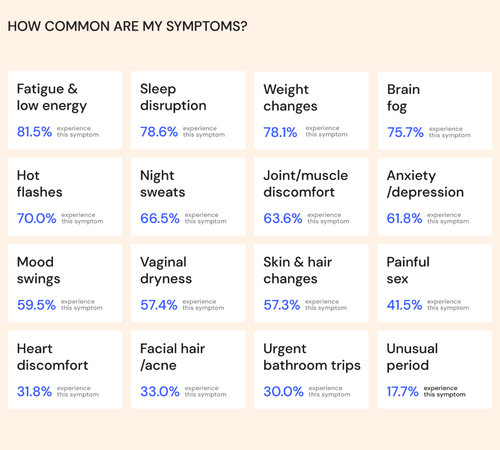When it comes to women’s health, there might not be a single word that carries more cultural baggage than “menopause” — which is equal parts silly and infuriating, seeing as how the term covers such a wide array of experiences, symptoms, and time frames for women. For example, we all know that hot flashes are a common symptom of menopause (since they’re constantly referenced in movies and television shows, more often than not as a punch line for an ageist joke), but did you know that hot flashes aren’t actually the most common symptom of menopause, to begin with? How about the fact that your menopause experience can change wildly, depending on your race?
A new study of over 100,000 patients has some jaw-dropping answers to those questions, and more. The study, which was conducted by Evernow, a women’s health company, is the largest and most comprehensive menopause study to date.
Here’s a breakdown of some of the most profound learnings from the study — including explanations of what’s “normal”, what’s not, and what your treatment options are, if you’re experiencing severe symptoms in your own life.
Menopause is life-changing — literally
When it comes to menopause, everyone always talks about hot flashes. But there are plenty of other ways that it can manifest in your body — and some of those symptoms can seriously suck.
Per the Evernow study, over 75 percent of patients reported these symptoms to be the most extreme during menopause: Weight changes, brain fog, fatigue, low energy, and sleep disruption. And more than 50 percent of patients reported other frustrating symptoms, including skin and hair changes, mood swings, and vaginal dryness.
Another interesting finding from the study showed that symptom severity can depend on a number of factors — one of which is your Body Mass Index (BMI). In the study, the higher a person’s BMI was, the more likely they were to experience more severe symptoms. For example, patients with a BMI under 29 were less than 50 percent likely to rate any menopause symptom as “severe,” while patients with a BMI of 40 or more were more than 50 percent likely to experience “severe” pain from menopause symptoms.

Most menopause symptoms differ by race — but why?
For decades now, it’s been believed that Black women experience more intense symptoms from menopause than other races — but this association has often been tied into other complicating factors, like obesity rates. To combat this information gap, the Evernow study set controls for these complicating factors, and the researchers were able to prove that these severe symptoms persisted for Black women of all sizes.
As it turns out, most menopause symptoms differ by race. Per the study, Hispanic women are most likely to experience all menopause symptoms except for weight gain, and Asian women, on the other hand, are less likely to experience night sweats and hot flashes.
But why do women of different races experience menopause differently?
Leah Millheiser, MD, Chief Medical Officer of Evernow, explained that the purpose of this study in particular was to prove that the connection between race and menopause is not directly caused by factors like BMI. “That’s [why] we dug deeper and controlled for BMI, and the higher rates and more severe experiences persisted,” Dr. Millheiser tells KCM. “We now have the opportunity to not only explore this further, but also create better solutions for more inclusive care.”
In other words, there isn’t a complete answer yet for why an Asian woman with the same salary, BMI, and socioeconomic background as a Hispanic woman might experience menopause in an entirely different way. But now that this study has established some guard rails, it creates more room for further studies in the future to dig deeper.
It also allows women to get hormone treatments that are tailored specifically for their own experience — more on that below.
How hormone therapy can help decrease symptom severity
The Evernow study didn’t just measure the various symptoms and severity that women experience throughout menopause — it also studied the efficacy of menopausal hormone therapy, a type of treatment some women elect to try when they experience severe symptoms from menopause.
“Menopausal hormone therapy (MHT) boosts the level of estrogen and progesterone that your body is producing less of as you enter menopause,” Dr. Millheiser explained. “This can help reduce the symptoms of menopause, which are the result of your body adjusting to these lower hormone levels.”
The Evernow study revealed a massive decrease in the severity of menopause symptoms for those who elected to try MHT. For example, 68 percent of patients who tried the hormone therapy said their severe symptoms became completely mild within three months of starting. How’s that for your second act?
Of course, you should always discuss any potential treatment therapy with your doctor. But you can also learn more about MHT by filling out a health profile with Evernow, too. Heck — why not do both, right now?









